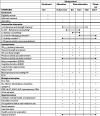Improving and preserving cardiorespiratory fitness, muscle strength and adiposity through a complex lifestyle intervention in community-dwelling older adults with elevated cardiometabolic risk: study protocol for the RESTART randomised controlled trial
- PMID: 40254301
- PMCID: PMC12010311
- DOI: 10.1136/bmjopen-2024-095810
Improving and preserving cardiorespiratory fitness, muscle strength and adiposity through a complex lifestyle intervention in community-dwelling older adults with elevated cardiometabolic risk: study protocol for the RESTART randomised controlled trial
Abstract
Introduction: As the global population ages, the incidence of cardiometabolic diseases and associated healthcare costs rise. There is a critical need for preventive interventions enabling long-lasting treatment effects to address the decline in physical performance and metabolic health among older adults. The RESTART (RE-inventing Strategies for healthy Ageing: Recommendations and Tools) randomised controlled trial (RCT) aims to evaluate whether a complex lifestyle intervention can improve and maintain cardiorespiratory fitness, muscle strength and body composition among older adults with elevated cardiometabolic risk.
Methods and analysis: This is the study protocol for the RESTART trial, a two-arm, open-label, parallel-group RCT conducted in Tromsø, Norway, targeting adults aged 60-75 with obesity, a sedentary lifestyle and high cardiovascular risk. Participants are block-randomised (1:1) into either an intervention or active control group. The initial intervention phase (12 months) includes: (a) supervised high-intensity aerobic and strength training (≥85% of maximum capacity) performed two times weekly, (b) behavioural counselling based on acceptance and commitment therapy during six group sessions and (c) dietary guidance based on national nutrition recommendations during two group/two individual sessions. After 12 months, participants are gradually introduced to exercise sessions offered by local organisations and fitness centres, to enable independent maintenance of lifestyle change. The primary outcome is a change in cardiorespiratory fitness (V̇O2max) at 24 months. Secondary and tertiary outcomes include additional parameters potentially sensitive to lifestyle change, such as 1-repetition maximum muscle strength, muscular power, device-measured physical activity levels, body composition, waist circumference, body weight, cognitive function and self-reported health-related quality of life. Data collection is scheduled at baseline, 6, 12 and 24 months, with health economic and qualitative analyses to evaluate the intervention's impact and participant experiences.
Ethics and dissemination: Ethical approval for the RESTART trial was obtained from the Regional Committee for Medical Research Ethics in Northern Norway. Results will be disseminated through peer-reviewed publications, conferences and community-based channels targeting older adults, healthcare providers and municipal health organisations. This trial will also inform public health strategies for lifestyle interventions among ageing populations.
Trial registration number: NCT06122441.
Keywords: Aging; Behavior; Exercise; NUTRITION & DIETETICS; Primary Prevention; Randomized Controlled Trial.
© Author(s) (or their employer(s)) 2025. Re-use permitted under CC BY. Published by BMJ Group.
Conflict of interest statement
Competing interests: The principal investigators have no financial or otherwise competing interests to declare.
Figures

References
-
- United Nations, Department of Economic and Social Affairs, Population Division World population ageing 2019. 2019.
-
- Langholz PL, Wilsgaard T, Njølstad I, et al. Trends in known and undiagnosed diabetes, HbA1c levels, cardiometabolic risk factors and diabetes treatment target achievement in repeated cross-sectional surveys: the population-based Tromsø Study 1994-2016. BMJ Open. 2021;11:e041846. doi: 10.1136/bmjopen-2020-041846. - DOI - PMC - PubMed
Publication types
MeSH terms
Associated data
LinkOut - more resources
Full Text Sources
Medical
Research Materials
